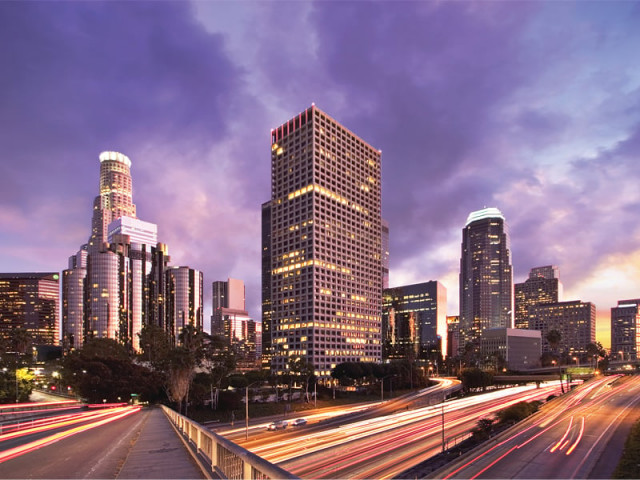Urban governance: ‘Karachi needs to do what LA did’
Governance in Pakistan should allow cities to be engines of growth.

Los Angeles in many physical, social and environmental ways finds similarity with Karachi. It has a vast landscape, a varied ethnic mix - the only city in the US with a non-native American mayor - and a history of serious ethnic and territorial tensions. If Karachi adopts its model of ‘charter city’, it can also improve its governance structure. PHOTOS: FILE
Despite the rapid growth of cities in Pakistan, where the average annual rate of urbanisation exceeds four per cent since 1951 - there is little progress on developing governance systems for cities.
Rather than facilitating cities to act as the country’s engines of growth, governance systems in Pakistan are, in a number of ways, stifling their capacity to do so. What is needed is a radical transformation in the way our cities are governed and legislated.

Karachi - a city of over 18 million inhabitants, a centre of commerce, trade and services with the highest literacy rate in Pakistan - is faced with a serious and rapidly escalating crisis in governance and sustainability. There are continuing unresolved conflicts between key political and non-state actors over control of land, resources and services that are exhibiting increasing complexity with a growing tendency of violent confrontations for leveraging political and administrative control. It is also unfortunate that the private sector, which has the potential to revitalise urban development, remains unutilised.
Karachi versus Los Angeles
This article aims to offer an alternative model of urban governance for the existing and emerging urban centres in Pakistan. This ‘charter or constitution city’ model potentially has the capacity to effectively respond to the emerging and future challenges by comparing Karachi with Los Angeles (LA), United States.
LA in many physical, social and environmental ways finds similarity with Karachi. It has vast landscape, a varied ethnic mix - the only city in the US with a non-native American mayor - and a history of serious ethnic and territorial tensions.

On June 8, 1999, the voters of LA adopted a new ‘city charter’, the first comprehensive and fundamental revision of the city’s governing document in 75 years. This charter came in response to the threat of the breakup of the city by a strong secessionist movement in several parts of the city, particularly in the San Fernando Valley. In response, LA leaders envisioned that, instead of closed-door political bargaining, better governance might help keep the city together - and it did! This potential needs to be explored and the same can happen in Karachi, as well.
Charter city
A charter city is a city in which the governing system is defined by the city’s own charter document. Such cities may be administered predominantly by citizens or through a third-party management structure, because a charter gives a city the flexibility to choose novel types of government structures. The fundamental document is the ‘city charter’ where no changes can be made without a vote of the people .Whether appointed or elected, all city officials are subject to recall by voters.
Another major challenge is the serious capacity deficit at the planning and technical staff level in city governments. In the case of LA, their city government has the office of the City Administrative Officer (CAO) that is appointed by the mayor with council’s approval, and is exempt from civil services. The CAO office serves as a central research staff for both the mayor and the council and assists both the two in the preparation and administration of the annual city budget. The staff consists of appointed experts in their relevant fields of experience.
Then there are the ‘boards’ and ‘commissions’ that serve as voices of city residents in the local government. The ‘charter’ calls for commissions to reflect the city’s diversity, including but not limited to communities of interest, neighbourhoods, ethnicity, race, gender, age and sexual orientation. The ‘charter’ also requires that some commissioners be chosen from particular geographic areas. These are some considerations that can provide workable solutions in an ethnically and politically divided city, such as Karachi.
Karachi, despite an inherent human resource and financial strength, still has to wait for financial packages from the federation to develop its key infrastructure. Not in the case of LA. The city runs its day-to-day operations using business-like principles, characteristic of large organisations. This can happen in Karachi and has the potential of changing the face of urban Pakistan for the better.
The writer is an urban planner and runs a non-profit organisation based in Karachi city focusing on urban sustainability issues. He can be reached at fanwar@sustainableinitiatives.org.pk
Published in The Express Tribune, November 18th, 2013.



















COMMENTS
Comments are moderated and generally will be posted if they are on-topic and not abusive.
For more information, please see our Comments FAQ